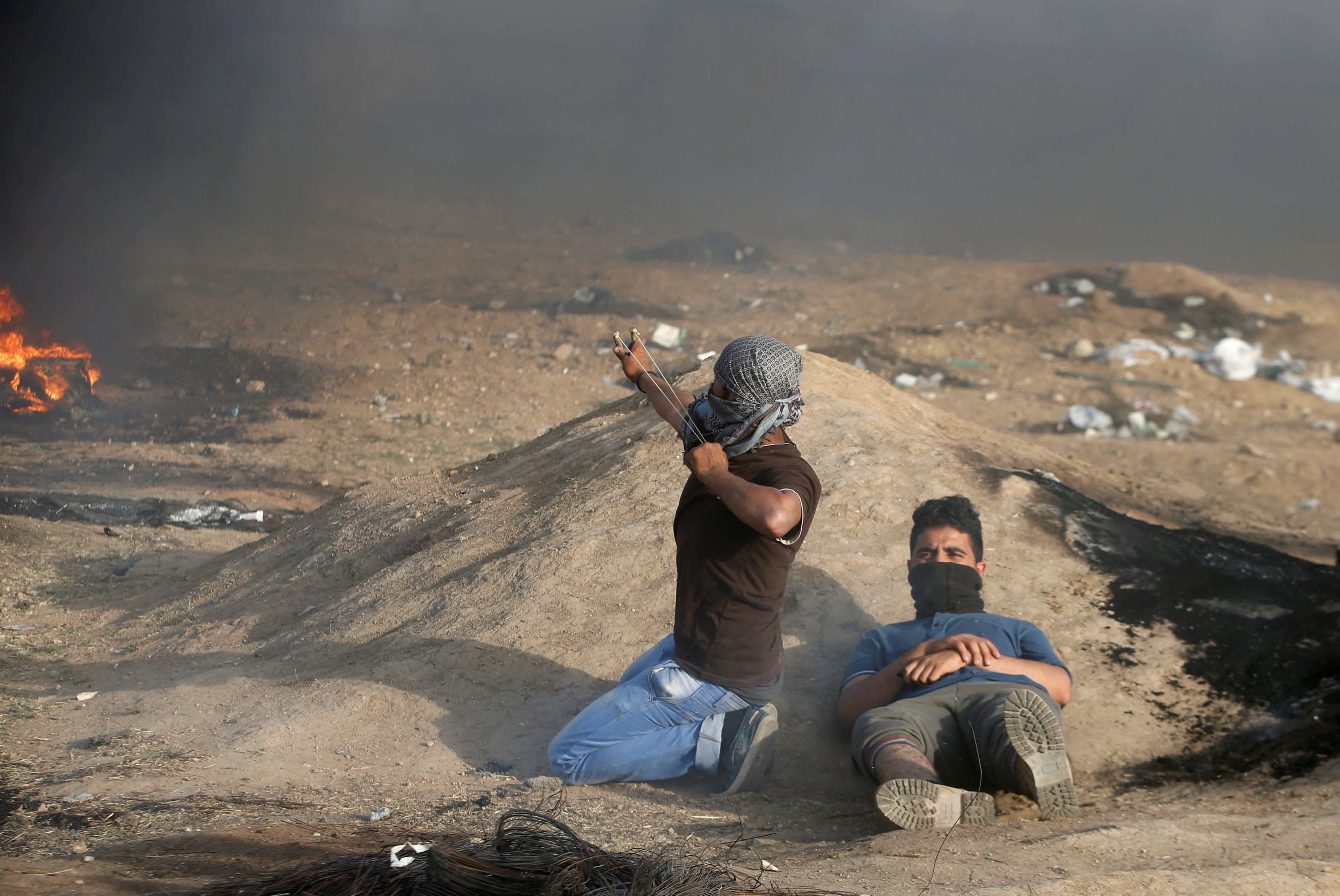 A Palestinian demonstrator uses a slingshot to hurl stones as another takes cover during a protest demanding the right to return to their homeland, at the Israel-Gaza border, east of Gaza City May 18, 2018. REUTERS/Mohammed Salem
A Palestinian demonstrator uses a slingshot to hurl stones as another takes cover during a protest demanding the right to return to their homeland, at the Israel-Gaza border, east of Gaza City May 18, 2018. REUTERS/Mohammed Salem Whatever your politics, the violence that unfolded last week on the border between Israel and Gaza should provoke a collective Jewish experience of soul-searching and empathy. That the maintenance of our precious homeland sometimes demands violence and death is something to lament and interrogate, not justify.
It is understood that Israel does what it must to defend itself. During a visit to Los Angeles last week, former Israeli Prime Minister Ehud Barak — who offered the Palestinians more than any other Israeli leader in history in the way of a two-state solution (which Palestinian Authority President Yasser Arafat rejected) — said the Israel Defense Forces had no other recourse to manage the recent border protests than the method they chose.
“We have extremely sophisticated means and tools to suppress and control riots when the riots are about the size of several hundred [people] and from distances of 10 to 30 yards,” Barak said. “But there are no effective means as of now to suppress riots when the audience is many thousands [of people] and the distance is 300 yards. It’s a pity we have not developed it.”
This pity left many of us helpless but to watch with deep concern and aching hearts as the Hamas-led suicide protest, intent on transgressing Israel’s border, forced Israeli soldiers to take up arms. The wrenching scene and misguided international outrage that followed placed many of us in an uncomfortable liminal space between defensiveness and empathy; blame and responsibility; justification for war and heartache in the face of tragedy.
But must we feel guilty? To what extent is the humanitarian crisis in Gaza the result of Israeli policy and how much responsibility should be laid at the feet of Hamas and its frenemy in the West Bank, the Palestinian Authority (PA)?
For Palestinians and much of the world, the Jewish original “sin” is that Israel was born at all.
“There’s a joint responsibility for the current situation in Gaza,” Avi Issacharoff, an Israeli journalist and co-creator of the Netflix show “Fauda,” told me.
It’s no secret that Gaza is in dire straits, swiftly careening toward an iceberg of uninhabitability: Water quality is poor; food insecurity affects most of the population; unemployment is ferociously high; hospitals lack life-saving materials; and Gazans subsist on only a few hours of electricty per day. For stated security reasons, Israel restricts the flow of people and goods going into and out of Gaza through the Rafah and Kerem Shalom border crossings. But sometimes those restrictions do not relate to security at all, like the barring of apricots and avocados as “luxury” items, or Israel’s inexplicable and unconscionable refusal in 2008 to allow Gazan students awarded Fulbright scholarships to leave the Strip. That kind of policy ensures that an alternative to Hamas will never emerge. In more ways that I can elucidate here, Israel has contributed to Gaza’s worsening problems. But it is not responsible for them.
“The greatest responsibility falls on Hamas,” said Issacharoff, who has covered Gaza and the West Bank for many years. “If Hamas would stop building their military force and start building infrastructure, there wouldn’t be any humanitarian crisis. If Hamas would change its ideology and strategy, suddenly you’d see Gaza flourishing.”
That may be overstating things since the West Bank — which is not run by Hamas — is hardly flourishing under Israeli occupation. Still, by comparison, quality of life there is better. And even though there is cooperation between the PA and Israel, the leadership in the West Bank and in the Gaza Strip share the same delusion that Israel will one day vanish and that the Palestinian right of return is a viable negotiating option.
“Hamas is not saying, ‘OK, give us two states,’ ” Issacharoff said. “Hamas is saying, ‘Without the right of return, we cannot even talk about a ceasefire; we cannot talk about anything.’ They know that the right of return is the end of the Israeli state, and this is their vision.”
One of the most worrying things about Hamas is that its existence has emboldened Israel’s one-state hardliners. “I think Israelis and Palestinians share the same fantasy,” Issacharoff said. “Make the other side disappear.”
For Palestinians and much of the world, the Jewish original “sin” is that Israel was born at all. Both by flight and by force, Palestinians were consequently displaced.
Should Jews feel bad about that? Of course. But should we undo what was necessary to reclaim our home?






















 More news and opinions than at a Shabbat dinner, right in your inbox.
More news and opinions than at a Shabbat dinner, right in your inbox.